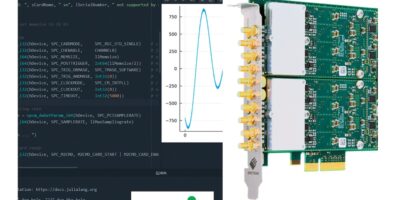Software development kit to program instrumentation using Julia
Julia is a relatively new software language which is comparable to programming in C in terms of speed and functionality, explains Spectrum Instrumentation. It additionall allows scientific and numerical computing. Spectrum has developed a software development kit (SDK) for programming its range of digitisers, generators and digital I/O products, using Julia.
The software language has been specifically designed for high-performance applications that require fast processing of data, like machine learning and scientific computing. In addition to libraries including optimised source C and Fortran code for linear algebra, random number generation, signal processing and string processing, it also offers parallelism. It allows users to call the desired script with a given number of cores and parallelise directly from a command line. It is possible to send tasks to different threads, or run loops in parallel, directly from code. While speed is simiilar to C, coding that is more comparable to Python or MatLab, says Spectrum.
Spectrum explains the synergy of Julia with its products which acquire or generate the fast electronic signals found in artificial intelligence (AI) applications or robotics. The company offers digitisers for the acquisition of analogue or digital signals, in the DC to GHz frequency range, with high precision and dynamic range. They are complemented by the company’s high-resolution arbitrary waveform generators (AWGs) for control signal generation, waveform replay and simulation. The products are available in a variety of form factors including tiny PCIe cards, which can plug directly into a PC, or LXI boxes that connect to a network or PC via Ethernet, plus PXIe modules for off-the-shelf installation into automated test systems.
Combining Julia with Spectrum Instrumentation products also helps to speed up processing and reduce latency, explains the company. The Spectrum products offer fast data transfers with a variety of different acquisition and generation modes (such as single, multiple, gated and FIFO) which helps to optimise testing throughputs. For applications which require fast decision making, such as autonomous vehicles, robotics, drones, imaging devices, medical appliances and control systems, the general purpose design of the instruments means they can also be used with almost any sensor (accelerometers, transducers, photo diodes, detectors, MEMS) commonly found in AI machines.
A recent example is Dr Josef Höffner’s work at the Leibniz Institute for Atmospheric Physics in Germany developing lidar (light detection and ranging) systems to measure temperature and wind speed in the atmosphere. The complex data acquisition and control, with 30 high speed signals uses three Spectrum Instrumentation cards and Julia which he described as a “combination of speed and dynamic programming, simplifying the software development”.
The new SDK supporting Julia is available free of charge to all Spectrum customers. Spectrum products include a five-year warranty with free software and firmware updates for each unit’s lifetime. Additionally, customers get support directly from Spectrum’s hardware and software engineers.




